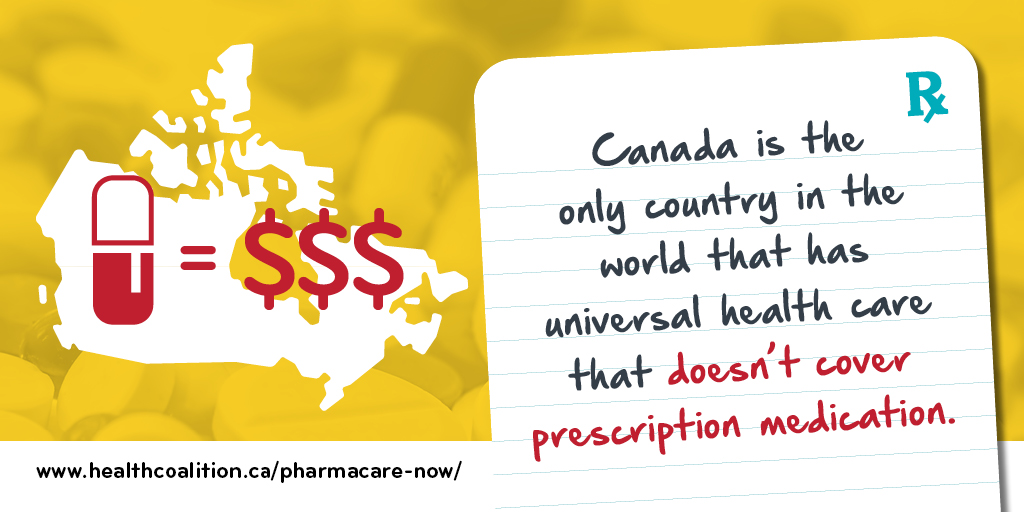Pharmacare and the Future of Healing

As Parliament closed this month to prepare for the surge of the Covid-19 pandemic in Canada, it unanimously passed a bill tabled by the NDP calling for the implementation of universal pharmacare by 2022. The move follows the release in June 2019 of the Advisory Council on the Implementation of National Pharmacare’s report, commissioned by the Trudeau government, with sixty recommendations detailing a clear plan for drug insurance across Canada, including a timeline calling for implementation starting in 2022 with a transition plan in place as soon as this year. According to the general consensus emerging out of its detailed study, the Council envisaged universal, publicly-funded coverage for medications, with the federal government as a key partner in financing the programme. The Council’s proposal, bold for our times in that it would see the biggest expansion of state-funded welfare in a generation, has spooked governments, who are already shuffling backwards, hedging their bets. The Canadian Medical Association, the Canadian Federation of Nurses Unions, and the Canadian Labour Congress have however already endorsed the plan.
Not just because I am a doctor, but this debate to me seems crucial with implications far beyond healthcare alone, as a snapshot of where our political imaginations lie. Health policy can often seem remote and technical to people not directly implicated, yet what we push pharmacare to become will shape the relationship between corporate power, state power, professional power, and communities, far into the future. Our response to the pharmacare proposal determines whether we are content with an incrementalist approach that abides by the political constraints of our times, or whether we can place this advance within a more liberatory vision of the society we wish to build. Engaged activists and organisers in Canada participating in how the plan for pharmacare rolls out can push at the boundaries of the realm of the possible.
Pharmacare is of course pragmatic and real, and not just a plaything for armchair politicking. I can recite cases to you etched in my memory where it would have altered the course of a patient’s illness. In the immediate, it is an essential intervention to improve people’s independence, to support their ability to live their lives out of hospital, and to equalise their access to care nested within their own communities. Canada is famously known as the only country with a universal health system (no matter how financed) that does not include prescription drug coverage. The piecemeal approach to medication insurance has meant that two people with otherwise similar medical conditions may pay almost none of the cost versus all of the cost, depending on province of residence, age, employment status, reliance on social assistance, or kinship ties to others. The working poor seem to be the most vulnerably placed in the current framework. The Broadbent Institute notes that as our economy transforms into increasing precarity of work, the reliance on employer-led insurances becomes less and less viable. Pharmacare’s implementation will be beneficial to many who live on the margins of the safety net, and that reality is to be embraced.
The federal government’s intervention through launching the advisory council – which might be read as another stalling tactic – is the result of decades of organising in communities to fulfil the full potential of universal health access by implementing pharmacare. All major federal political parties in Canada have converged towards a consensus on its necessity – even the Conservatives voted for the NDP’s bill – the result of tireless advocacy and organising across generations. But the details will be crucial. Similar to way Medicare itself has developed, the underlying assumptions we lock ourselves into now will erect the terms of debate for decades to come, and we should at the very least understand what power dynamics we are calcifying into immutable structure for the foreseeable future through the system that is being built.
To me, three assumptions that seem fundamental to pharmacare as currently imagined are: 1) that the state is the best engine of redistribution of resources for our communities, 2) that we can rely on industry to provide what we need, and 3) that we can rely on professional authority to be gatekeepers to our healing. Naming these assumptions can be uncomfortable, and imagining alternatives distressing, but without confronting them, we cannot know whether we still believe these beliefs continue to best serve the principles of justice and equity.
State as redistributor of wealth
Pharmacare can be considered a redistributive project, ensuring resources are directed to where they are needed. But it goes without saying that the state has demonstrably been an imperfect mechanism in this regard. Medicare itself has entrenched the private profit of physicians in order to buy their participation in universal health insurance, skewing spending priorities. And beyond health services alone, witness the contemporary incapacity of the state to protect the marginally housed in the face of speculative capital, or its complicity with distributing the costs of environmental destruction disproportionately on Indigenous peoples.
Will pharmacare befall the same fate, despite recommendations for a universal pharmacare programme funded out of the general tax pool? The one jurisdiction in Canada that has implemented universal drug insurance – Québec – has opted for a social insurance model rather than a universal, publicly-funded one. Politicians are turning towards this model as an expedient example of a system that already exists in Canada, but conveniently does not threaten the interests of the insurance industry. Although patients in Québec do largely get covered (assuming they can cover the copayments), the fractured model of social insurance contributes to the reality that drug expenditure per capita in Québec remains amongst the highest in Canada. Crucially, the federal bill tabled by the NDP is vague on the exact mechanisms the federal government will use to support provincial and territorial government medication programmes, whereby funding would be conditional on abiding by the principles of universality, comprehensiveness, accessibility, portability, and public administration. The federal government has not been particularly proactive in penalising provinces that have undercut these principles in Medicare itself, so how it plays out in pharmacare remains to be seen.
Indeed, in the relatively feeble mechanisms the federal government has instituted to monitor medication accessibility in Canada, it is only as late as August 2019 that the federal government at long last agreed to change the basket of countries to which drug prices in Canada were compared to deem whether they were reasonable. For a long time, this basket included the United States and Switzerland, the only two countries in the world where prices are higher than Canada, widely considered to be exceptional outliers. Those two countries have now been removed from the list, and a more comparable basket of countries with more similar health systems in place are used. This relatively small victory over the interests of pharmaceutical companies still does not quite have extensive enforceable power on pharmaceutical access, although it may start to control costs for Canadian buyers.
We should carefully monitor how these dynamics are settled. Without organised pressure from movements, the compromise may settle far from what is best for communities, and leave us trapped within inflexible systems as pharmacare is instituted. Even small wins on this front could pave the way ahead for altering the way the state negotiates with communities to come.
Industry as provider of our needs
The pharmaceutical industry remains one of the most profitable industries under contemporary capitalism. Pharmacare does mean that we would be accepting that significant chunks of public dollars would be directed towards subsidising their profits.
Indeed, one pressing question to ask is why pharmaceutical costs take up so much of collective health spending. Does the investment in resources result in a concomitant increase in quality of life? The Canadian Federation of Nurses’ Unions have monitored the monopolisation of politicians’ bandwidth by the pharmaceutical industry in Canada. Drug prices have skyrocketed as the frequency of meetings between lobbyists and parliamentarians increase. In the context of global capital mobility, this problem is not Canada’s alone. Take for example, the recent debates around the generic versions of biotherapeutic drugs. These protein-based therapies have become particularly important in treating diseases such as autoimmune illnesses and cancers – and as of writing in March 2020, anecdotal evidence emerging that one (though with a checkered history) may be effective in treating severe Covid-19 disease in China and Italy – but they remain shockingly expensive, even after the introduction of generic versions. Even India, once considered to have the most pro-people pharmaceutical regimens in the world holding a significant portion of the world’s generic market, now requires that all generics, including biotherapeutics, undergo separate, complete clinical trials. Done for the presumed basis of patient safety, it greatly increases the cost of generic versions – and as an interesting side-effect, protects brand-name pharmaceutical companies. Canada’s quest for pharmacare does not operate in isolation from the designs of this powerful industry, structured by the dynamics of global capitalism whereby states protect companies and not people. The argument that without profit margins being sustained, innovation in drugs will evaporate flies in the face of demonstrable history of medicine before capitalism, when healers developed empiric treatments within traditional knowledge systems simply because they worked to ease suffering, rather than to hoard financial benefit.
Victories in the USMCA negotiations mean that pharmaceutical companies have lost some of their capacity to prolong patent protections, bowing to considerable popular pressure. But another major player in these questions is the insurance industry. As noted in the evolution of the social insurance model of universal health in Europe, as well as through the lead-up to the Affordable Care Act in the United States, the interests of established privately-managed insurance funds weigh heavily on the compromises made in the roll-out of universal benefits. The Canadian Chamber of Commerce’s response to the Advisory Council’s report is transparently about protecting its insurance-related members interests, asking the federal government not to “crowd out” options for the Canadians already adequately insured. But an enforced two-tier system of social insurance can lead to some ludicrous outcomes. Even though I am an employed person who does not use much medication happily paying my premiums, the Québec government actively de-enrolled me from the public plan – considered in social insurance models as the coverage of last resort – and ordered me instead to pay into a private insurance fund, thereby funnelling my premiums into shareholder dividends, rather than into a stretched public plan destined to buy medications for the elderly or those with disabilities.
The federal government has still not explicitly committed to a universal publicly-funded plan rather than a social insurance model that entrenches private insurance funds into the system, but it will likely be unable to resist corporate interests unless compelled to do so by organised pressure.
Medical authority as purveyor
Perhaps the most difficult topic to tackle whose ambit goes far beyond pharmacare alone is the role of professional authority in our social systems. With the implementation of pharmacare, access to medications with stock formularies will be restricted by collaboration between physicians and budget managers. The question remains is whether this system of health and healing is the one we imagine for ourselves into the future. It may well be, but what does it preclude if we opt for it?
On a very pragmatic level, will the billions of dollars we invest in pharmacare have the same effect on health outcomes as if we invested in social housing or welfare services? Or if we used it to dismantle the fossil-fuel economy? The belief that access to formal healthcare – our contemporary system of medicine – is the be-all and end-all of health is evidently untrue, and could we as a society make better choices?

